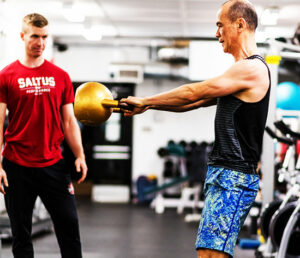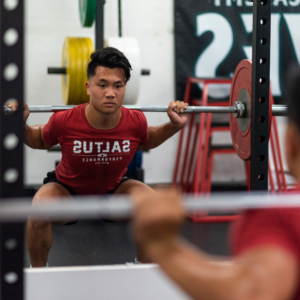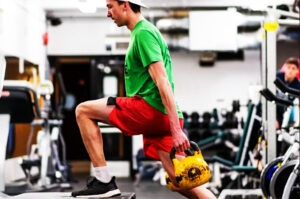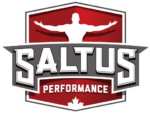BY SEAN DEL BEN, MKIN, CSCS, FMS LVL.2, FRC
What is the role of strength training in track & field? Recently I had the great experience of attending the 1st annual International Conference of Athletics Excellence here in Vancouver. This conference included some of the biggest names in the track & field and performance world. Dan Pfaff, Dr. Anatoliy Bondarchuk, PJ Vazel, Derek Evely, and Fuzz Caan. For those who don’t know, these coaches specialize in sprint, jumps, and throws events, not endurance events.
A hallmark of a good conference is whether or not you’re left with more questions than answers. It’s good to have your ideas reinforced, although you also want to walk away with at least one thought-provoking concept. It’s great if you are required to explain your position to others. Teaching is one of the best forms of learning.
One theme that many of the presenters seemed to touch upon throughout the conference was whether or not they have their athletes’ lift weights during adolescence and young adulthood. At one point, Dan Pfaff stirred the pot by saying he doesn’t have his older adult athletes lift at all.
Many of the actual track coaches (as opposed to a strength coach) in attendance took this suggestion to confirm their own philosophy of not having their athletes lift. That, or kept the information for later review without giving it much thought. However, the comments left many of the strength coaches in attendance scratching their heads. This is confusing because the research is pretty clear. The research shows that strength training has positive effects on acceleration, vertical leap, throwing distance, and injury prevention.
Many were wondering how could these world-class track coaches seem to be so far behind the times. Particularly when much of the original scientific research on performance enhancing training methods was conducted by track & field specialists (i.e Prof. Yuri Verkoshansky). Personally, I’m passionate about preaching the benefits of proper performance training for youth athletes (and athletes in general). It can be frustrating when influential people use their considerable reach to seemingly espouse the opposite message.
Rather than become an emotional person who is outraged at every opportunity, it’s beneficial to stop and think critically. Less you cause yourself undue stress or become one who simply just miss the boat on the point someone was trying to make. I wanted to write a short article to not only solidify my own thoughts on the matter, but also to generate discussion and hopefully build upon the thoughts that I believe the presenters were trying to make but were limited in making due to the type of forum they were in, and time constraints they were under. I’m positive there are other strength coaches and track coaches who are trying to find their way through the weeds on this topic.
Much of the below will simply be thinking out loud, aiming to find common ground.
FINDING COMMON GROUND & CONTEXT
The first step in any discussion is determining common ground and clarifying the context surrounding what the coaches were presenting. Consider the following:
-When coaches say that they do not have their athletes strength train, are they speaking purely with regards to General Physical Preparation (GPP), or also Special Physical Preparation (SPP)?
-As track & field coaches, do the presenters view GPP/SPP differently than generalist strength coaches do? Generalist strength coaches being those whose sole profession is that of a strength coach. A strength coach is capable of working with a multitude of different sports and populations. Many SPP methods wouldn’t necessarily be considered ‘strength training’ by a strength coach. SPP may be considered sufficient to improve performance from the vantage point of a track & field coach.
-When discussing training methodology for their more mature athletes, some of the presenters mentioned that they do not have them strength train. However, it is possible that these athletes already have a very long history of GPP training earlier in their careers. This high training age may render it unnecessary for them to try to continue to build upon that. Furthermore, if the coaches DON’T lump SPP in with their definition of ‘strength training’, then it’s possible that the athletes are still developing explosiveness with loads above and beyond that which their sport requires.
STRENGTH COACHES & TRACK COACHES ARE MORE SIMILAR THAN YOU THINK
-Are the track & field coaches still using other drills to develop their athletes’ mobility, stability, and overall movement patterns? Or are they simply having the athlete perform the sport movement over and over? It’s possible that a strength coach could hear ‘we don’t have our athletes’ strength train’, and assume that this also includes neglection of mobility, stability, and ‘core’ strength as well. In my opinion, a lot of strength coaches fail to realize that the degree of separation between a track & field coach and a strength coach is fairly small. Track & field is literally ‘how explosive can we make our athletes?’. This opposed to most team sports which are based upon ‘how can our players’ put this ball in a net, regardless of how slow and immobile they may be?’.
-When the track & field coaches say they don’t have their athletes’ strength train at certain points in their development, are they only referring to maximal strength training (i.e loads >85% 1RM)? Are they still performing Dynamic Effort lifts, focusing on the speed of the lift (i.e loads 60-85% of 1RM).
-If young track & field athletes are not putting a focus on strength training with the aim of greatly improving their strength levels, are they at least learning the mechanics of lifting? This way they can hit the ground running when their T&F coach does decide to increase their focus on becoming stronger?
ROLE OF THE STRENGTH COACH, TRACK & FIELD COACH, AND CLINICIAN IN THE ATHLETE DEVELOPMENT PROCESS
-Below is a graph outlining the roles of the strength coach, track coach, and clinician within an integrated athlete development environment. I will definitely note that there SHOULD be overlap within each of these roles. All of the professions listed should have at least a working knowledge of every process listed here. Having knowledge of each process will allow for optimal athlete care and development.
-It should also be understood that I’m aware that strength coaches have the ability (or should) to prescribe SPP, periodize training, coach at least basic speed, throwing, and jumping mechanics, along with corrective exercise prescription. The point of this graph is to outline which profession should specialize and take the lead within each process taking place in an INTEGRATED environment. In many cases, a track coach will not have a strength coach and clinician available and vice versa. Therefore, the roles would overlap significantly; and although the processes may not be OPTIMIZED, the goal for each profession is still to make the athlete bigger, faster, stronger, and more durable.
-In my opinion, the role of a strength coach is to be an extreme generalist. A dependable strength coach should be able to competently coach sprinting, jumping, weightlifting, as well as introduce corrective exercise concepts. It would serve a strength coach well to be competent in these areas if they wish to be successful in many high school, collegiate, professional, or national training center environments.

FURTHER QUESTIONS ABOUT STRENGTH TRAINING THAT WE CAN CLARIFY WITH THE TRACK & FIELD COACH
-Is there a long-term plan on the part of the T&F coaches who don’t advocate for strength training during adolescence?
-Are T&F coaches knowingly sacrificing current performance in the name of not peaking the athlete too early? (Likely only applies to the most naturally gifted athletes).
-Is this system of development geared for the elite performer who is guaranteed to at least compete for a high collegiate or national level program?
-What about the athlete who is on the fence of earning a scholarship or making a national program?
-Strength training pre-dominantly improves performance during longer ground contact time movements (i.e acceleration in sprinting) Strength training also helps to maintain posture at top speeds. Are these T&F coaches purposefully foregoing development of the athletes’ acceleration until they are older? Reactive strength peaks during the late teenage years. The line of thinking for these T&F coaches may be to focus entirely on that athletic quality prior to working on acceleration during the years where their maximal and explosive strength will be peaking in their mid-late 20’s, and reactive strength will be starting to decline.
-If these T&F coaches are aiming to focus entirely on reactive strength during adolescence and the early 20’s, it is worth noting that maximal strength can temporarily have a negative impact on reactive strength in the short term (until it increases with super-compensation). This line of thinking brings us back to our previous question. We need to know if these T&F coaches also don’t advocate for Dynamic Effort strength training. Dynamic effort is proven to develop both maximal strength and explosiveness at the same time. You can develop both of these qualities without the temporary negative effects of maximal strength training (ex. powerlifting).
…BUT WHAT ABOUT THE HORMONES?
-One of the benefits of strength training during adolescence and early adulthood is the advantageous hormonal environment. At these ages, a person experiences lifetime high levels of testosterone and growth hormone (especially males, but females too). Athletes’ who take advantage of this hormonal environment have a much higher chance of reaching their absolute genetic potential. So the question is, do sprints and explosive plyometrics and SPP drills take advantage of these sky-high levels of testosterone and growth hormone during adolescence in the same way that heavy strength training does?

THE ROLE OF A TRACK COACH VS A TEAM SPORT COACH
A typical reaction from a career strength & conditioning coach to hearing that track & field coaches for the speed/power events don’t have their athletes lift might sound like, “It’s 2018, how do you not know the benefits of strength training for your athletes!?“.
TRACK
Don’t be too critical of a sprint, jumps, or throws coach who does not have their athletes lift. Take a moment to remember that the goal of their sport is literally to make their athletes jump higher, sprint faster, and throw further. Even in the event that they are not even performing light strength training movements, they are still focused on using drills to improve their athletes’ mobility & stability. This along with plyometric drills, and most likely explosive SPP drills with weighted implements.

TEAM SPORT
This is much different from the typical team sport which usually has an overall goal of putting an object in a net. Athleticism helps, but if the slowest person in the world is successful at getting the object in the net, nobody will care.
Participation in the vast majority of team sports on its own does not inherently develop explosiveness either. Many team sports pre-dominantly involve the anaerobic-lactate energy system. This compared to jumps, sprints, and throws T&F events which are for the most part purely developing the anaerobic-creatine phosphate energy system. Utilizing the anaerobic-CPP energy system will develop strength & explosiveness.
Coaches of team sports have very little regard for developing their players’ movement patterns, strength, or explosiveness. If they do, they have very little experience related to proper technique, biomechanics, appropriate loading and volume parameters. Typically they don’t understand that there is a difference between having the athlete puke and getting faster. Track & field coaches understand all of this.
ANALOGY TO PONDER
Take an Olympic weightlifting coach who doesn’t have their athletes do accessory lifts. Accessory lifts include back squats, barbell rows, and Romanian deadlifts. Would you still criticize them for not ‘strength training’? A track & field coach’s role is to make their athletes faster and more explosive. An Olympic weightlifting coach makes their athletes stronger and more explosive. They are simply at opposite ends of the speed-strength spectrum.
However, the physical qualities of both sports may overlap within the Dynamic Effort zone of 60-85% of 1RM. A sprinter is going to be able to hang clean a hefty amount if taught the coordination of the movement. An Olympic weightlifter is going to be able to run 20-60m pretty damn fast if they have learned some basic sprinting mechanics.
THOUGHTS ON STRENGTH VS. WEIGHT ROOM COORDINATION
-Consider an athlete who has a 40 inch standing vertical jump. They walk into the weight room for the first time barely squatting 135lbs. Does that indicate that they are weak? Or are they simply lack intramuscular and intermuscular coordination in the new movement patterns we are asking them to perform? How freakishly strong would they be in the weight room after strength training 2-3x per week for only 12 weeks.
-12 weeks of coordination training may be the only thing separating a very explosive sprinter who can squat 135lb from a 500lb squat. Is there truly a benefit of a rigorous strength training program (not to suggest zero strength training) for this person?
-Will the benefits of strength training show themselves once the sprinter begins lifting often enough that strength improvements are true increases in their ability to produce muscular force? Will they see tangible improvements on the track during the first 12 weeks, within the coordination development phase?
